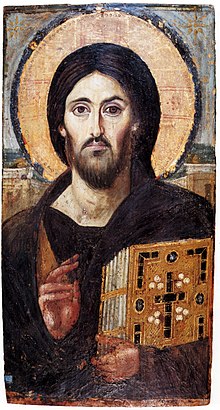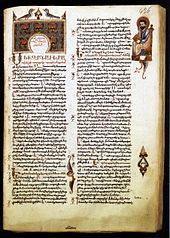Christ (title)
| Part of a series on |
| Christianity |
|---|
Christ,[note 1] used by Christians as both a name and a title, unambiguously refers to Jesus.[5][6][7] It is also used as a title, in the reciprocal use "Christ Jesus", meaning "the Messiah Jesus", and independently as "the Christ".[8] The Pauline epistles, the earliest texts of the New Testament,[9] often refer to Jesus as "Christ Jesus" or "Christ".[10]
The concept of the Christ in Christianity originated from the concept of the messiah in Judaism. Christians believe that Jesus is the messiah foretold in the Hebrew Bible and the Christian Old Testament. Although the conceptions of the messiah in each religion are similar, for the most part they are distinct from one another due to the split of early Christianity and Judaism in the 1st century.
Although the original followers of Jesus believed Jesus to be the Jewish messiah, e.g. in the Confession of Peter, Jesus was usually referred to as "Jesus of Nazareth" or "Jesus, son of Joseph",[11]
Jesus came to be called "Jesus Christ" (meaning "Jesus the Khristós", i.e. "Jesus the Messiah" or "Jesus the Anointed") by Christians, who believe that his crucifixion and resurrection fulfill the messianic prophecies of the Old Testament.
Etymology[edit]
Christ comes from the Greek word χριστός (chrīstós), meaning "anointed one". The word is derived from the Greek verb χρίω (chrī́ō), meaning "to anoint."[12] In the Greek Septuagint, χριστός was a semantic loan used to translate the Hebrew מָשִׁיחַ (Mašíaḥ, messiah), meaning "[one who is] anointed".[13]
Usage[edit]
The word Christ (and similar spellings) appears in English and in most European languages. English-speakers now often use "Christ" as if it were a name, one part of the name "Jesus Christ", though it was originally a title ("the Messiah"). Its usage in "Christ Jesus" emphasizes its nature as a title.[8][14] Compare the usage "the Christ".[15]
The spelling Christ in English became standardized in the 18th century, when, in the spirit of the Enlightenment, the spelling of certain words changed to fit their Greek or Latin origins. Prior to this, scribes writing in Old and Middle English usually used the spelling Crist—the i being pronounced either as /iː/, preserved in the names of churches such as St Katherine Cree, or as a short /ɪ/, preserved in the modern pronunciation of "Christmas". The spelling "Christ" in English is attested from the 14th century.[16]
In modern and ancient usage, even in secular terminology, "Christ" usually refers to Jesus, based on the centuries-old tradition of such usage. Since the Apostolic Age, the
Background and New Testament references[edit]
Pre-New Testament references[edit]
In the Old Testament, anointing was a ceremonial reserved to the Kings of Israel (1 Kings 19:16; 24:7), Psalms 17 (18):51), to Cyrus the Great (Isaiah 45:1), to the High Priest of Israel, the patriarchs (Psalms 104(105):15 and to the prophets.[18][12]
In the Septuagint text of the deuterocanonical books, the term "Christ" (Χριστός, translit. Christós) is found in 2 Maccabees 1:10[19][20] (referring to the anointed High Priest of Israel) and in the Book of Sirach 46:19,[21][22] in relation to Samuel, prophet and institutor of the kingdom under Saul.
At the time of Jesus, there was no single form of Second Temple Judaism, and there were significant political, social, and religious differences among the various Jewish groups.[23] However, for centuries the Jews had used the term moshiach ("anointed") to refer to their expected deliverer.[17]
Opening lines of Mark and Matthew[edit]
Mark 1:1 ("The beginning of the gospel of Jesus Christ, the Son of God") identifies Jesus as both Christ and the Son of God. Matthew 1:1 uses Christ as a name and Matthew 1:16 explains it again with: "Jesus, who is called Christ". The use of the definite article before the word "Christ" and its gradual development into a proper name show that the Christians identified Jesus with the promised messiah of the Jews who fulfilled all the messianic predictions in a fuller and a higher sense than had been given them by the rabbis.[17]
Confession of Peter (Matthew, Mark and Luke)[edit]
The so-called Confession of Peter, recorded in the Synoptic Gospels as Jesus's foremost apostle Peter saying that Jesus was the Messiah, has become a famous proclamation of faith among Christians since the first century.[23]
Martha's statement (John)[edit]
In John 11:27 Martha told Jesus, "you are the Christ, the Son of God, who is coming into the world", signifying that both titles were generally accepted (yet considered distinct) among the followers of Jesus before the raising of Lazarus.[24]
Sanhedrin trial of Jesus (Matthew, Mark and Luke)[edit]
During the Sanhedrin trial of Jesus, it might appear from the narrative of Matthew that Jesus at first refused a direct reply to the high priest Caiaphas's question: "Are you the Messiah, the Son of God?", where his answer is given merely as Σὺ εἶπας (Su eipas, "You [singular] have said it").[25] Similarly but differently in Luke, all those present are said to ask Jesus: 'Are you then the Son of God?', to which Jesus reportedly answered: Ὑμεῖς λέγετε ὅτι ἐγώ εἰμι (Hymeis legete hoti ego eimi, "You [plural] say that I am".[26] In the Gospel of Mark, however, when asked by Caiaphas 'Are you the Messiah, the Son of the Blessed One?', Jesus tells the Sanhedrin: Ἐγώ εἰμι (ego eimi, "I am").[27] There are instances from Jewish literature in which the expression "you have said it" is equivalent to "you are right".[28] The Messianic claim was less significant than the claim to divinity, which caused the high priest's horrified accusation of blasphemy and the subsequent call for the death sentence. Before Pilate, on the other hand, it was merely the assertion of his royal dignity which gave grounds for his condemnation.[28]
Pauline epistles[edit]
The word "Christ" is closely associated with Jesus in the Pauline epistles, which suggests that there was no need for the early Christians to claim that Jesus is Christ because it was considered widely accepted among them. Hence Paul can use the term Khristós with no confusion as to whom it refers, and he can use expressions such as "in Christ" to refer to the followers of Jesus, as in 1 Corinthians 4:15 and Romans 12:5.[29] Paul proclaimed him as the Last Adam, who restored through obedience what Adam lost through disobedience.[30] The Pauline epistles are a source of some key Christological connections; e.g., Ephesians 3:17–19 relates the love of Christ to the knowledge of Christ, and considers the love of Christ as a necessity for knowing him.[31]
There are also implicit claims to him being the Christ in the words and actions of Jesus.[28][clarification needed]
Use of Messias in John[edit]
The Hellenization Μεσσίας (Messías) is used twice to mean "Messiah" in the New Testament: by the disciple Andrew at John 1:41, and by the Samaritan woman at the well at John 4:25. In both cases, the Greek text specifies immediately after that this means "the Christ."[15]: 509
Christology[edit]
Christology, literally "the understanding of Christ,"[32] is the study of the nature (person) and work (role in salvation) of Jesus in Christianity.[33][34][35][36] It studies Jesus Christ's humanity and divinity, and the relation between these two aspects;[37] and the role he plays in salvation.
From the second to the fifth centuries, the relation of the human and divine nature of Christ was a major focus of debates in the early church and at the first seven ecumenical councils. The Council of Chalcedon in 451 issued a formulation of the hypostatic union of the two natures of Christ, one human and one divine, "united with neither confusion nor division".[38] Most of the major branches of Western Christianity and Eastern Orthodoxy subscribe to this formulation,[38] while many branches of Oriental Orthodox Churches reject it,[39][40][41] subscribing to miaphysitism.
According to the Summa Theologica of Thomas Aquinas, in the singular case of Jesus, the word Christ has a twofold meaning, which stands for "both the Godhead anointing and the manhood anointed". It derives from the twofold human-divine nature of Christ (dyophysitism): the Son of man is anointed in consequence of His incarnated flesh, as well as the Son of God is anointing in consequence of the "Godhead which He has with the Father" (ST III, q. 16, a. 5).[42]
Symbols[edit]
The use of "Χ" as an abbreviation for "Christ" derives from the Greek letter Chi (χ), in the word Christós (Greek: Χριστός). An early Christogram is the Chi Rho symbol, formed by superimposing the first two Greek letters in Christ, chi (Χ) and rho (Ρ), to produce ☧.[43]
The centuries-old English word Χmas (or, in earlier form, XPmas) is an English form of χ-mas,[44] itself an abbreviation for Christ-mas. The Oxford English Dictionary (OED) and the OED Supplement have cited usages of "X-" or "Xp-" for "Christ-" as early as 1485. The terms "Xpian" and "Xren" have been used for "Christian", "Xst" for "Christ's" "Xρofer" for Christopher and Xmas, Xstmas, and Xtmas for Christmas. The OED further cites usage of "Xtianity" for "Christianity" from 1634.[note 2] According to Merriam-Webster's Dictionary of English Usage, most of the evidence for these words comes from "educated Englishmen who knew their Greek".[46][47]
The December 1957 News and Views published by the Church League of America, a conservative organization founded in 1937,[48] attacked the use of "Xmas" in an article titled "X=The Unknown Quantity". Gerald L. K. Smith picked up the statements later, in December 1966, saying that Xmas was a "blasphemous omission of the name of Christ" and that "'X' is referred to as being symbolical of the unknown quantity."[49] More recently, American evangelist Franklin Graham and former CNN contributor Roland S. Martin publicly raised concerns. Graham stated in an interview that the use of "Xmas" is taking "Christ out of Christmas" and called it a "war against the name of Jesus Christ."[50] Roland Martin relates the use of "Xmas" to his growing concerns of increasing commercialization and secularization of what he says is one of Christianity's highest holy days.[51]
See also[edit]
- Chrism
- Ichthys
- Kerigma
- Knowledge of Christ
- Masih
- Names and titles of Jesus in the Quran
- Perfection of Christ
- You are Christ
Notes[edit]
- ^ Pronounced /kraɪst/. From Latin: Christus; from Greek: χριστός, translit. khristós, lit. "anointed, covered in oil"; a semantic loan of Imperial Aramaic: משיחא, romanized: məšīḥā or Hebrew: מָשִׁיחַ, romanized: māšîaḥ, lit. 'messiah'; from Imperial Aramaic: משח, romanized: məšaḥ or Hebrew: מָשַׁח, romanized: māšaḥ, lit. 'to anoint'.[3][4] Alternatively (Messiah or Messias): Latin: messias, from Greek: μεσσίας (alternative to χριστός), from the same Semitic word.
- ^ Viz. 1485 Rolls of Parliament VI.280/I The most famous, beloved, and Xren Prince. 1573 Baret Alv. s.v. V. "The long mistaking of this woorde Xps standing for Chrs by abbreuiation which fore lacke of knowledge in the greeke they tooke for x,p, and s, and so likewise Xpofer. 1598 Rowlands Betraying of Christ Hunter, Cl. 25 "Xpian the outward, the inward not at all"; 1634 Documents against Prynne, Camden, 33 "Such right...as your Xtianity, place, and function joyntly require." 1697 Aubrey Lives Milton (MS Aubrey 8, lf. 63) "He was so faire, that they called him the lady of Xts college."[45]
References[edit]
- ^ Schönborn, Christoph (1994). God's human face: the Christ-icon. p. 154. ISBN 0-89870-514-2.
- ^ Galey, John (1986). Sinai and the Monastery of St. Catherine. p. 92. ISBN 977-424-118-5.
- ^ Zanzig, Thomas (2000). Jesus of history, Christ of faith. p. 314. ISBN 0-88489-530-0.
- ^ "Etymology Online: messiah". Etymonline.com. Retrieved November 19, 2010.
- ^ Prager, Edward (2005). A Dictionary of Jewish-Christian Relations. p. 85. ISBN 0-521-82692-6.
- ^ Zanzig, Thomas (2000). Jesus of history, Christ of faith. p. 33. ISBN 0-88489-530-0.
- ^ Espin, Orlando (2007). n Introductory Dictionary of Theology and Religious Studies. p. 231. ISBN 978-0-8146-5856-7.
- ^ a b Pannenberg, Wolfhart (1968). Jesus God and Man. pp. 30–31. ISBN 0-664-24468-8.
- ^ Borg, Marcus (August 31, 2012). "A Chronological New Testament". The Huffington Post.
- ^ "Saint Paul, the Apostle". Encyclopædia Britannica. Retrieved May 23, 2013.
- ^ "Jesus Christ". Encyclopædia Britannica. Retrieved May 23, 2013.
- ^ a b χριστός. Liddell, Henry George; Scott, Robert; A Greek–English Lexicon at the Perseus Project
- ^ Messiah Retrieved February 4, 2020
- ^ Doniger, Wendy (2000). Merriam-Webster's Encyclopedia of World Religions. Merriam-Webster. p. 212. ISBN 0-87779-044-2.
- ^ a b Bauer, Walter, et al., eds. (1957). "Μεσσίας, ου, ὁ". A Greek–English Lexicon of the New Testament and Other Early Christian Literature (1 ed.). Chicago: University of Chicago Press.
- ^ "Christ". Oxford English Dictionary (Online ed.). Oxford University Press. (Subscription or participating institution membership required.)
- ^ a b c Herbermann, Charles, ed. (1913). . Catholic Encyclopedia. New York: Robert Appleton Company.
- ^ "What Do 'Messiah' and 'Jesus Christ' Mean?. Both Christ and Messiah mean anointed or anointed one". January 26, 2011. Archived from the original on June 22, 2016. Retrieved September 17, 2018.
anointing was a rite of kingship in Syria-Palestine in the fourteenth century BCE.
- ^ "1611 King James Bible, Second Book of Maccabees, chapter 1, verse 10". kingjamesbibleonline.org.
- ^ "Greek Septuagint and Wiki English Translation, Second Book of Maccabees, chapter 1". katabiblon.com (in English and Greek). Archived from the original on October 4, 2018.
- ^ "1611 King James Bible, Book of Sirach, chapter 46, verse 19". kingjamesbibleonline.org.
- ^ "Greek Septuagint and Wiki English Translation, Book of Sirach, chapter 46". katabiblon.com (in English and Greek). Archived from the original on October 5, 2018.
- ^ a b Ekstrand, Donald W. (2008). Christianity. pp. 147–150. ISBN 978-1-60477-929-5.
- ^ Ekstrand, Donald W. (2008). Christianity. p. 81. ISBN 978-1-60477-929-5.
- ^ Matthew 26:63–64.
- ^ Luke 22:70.
- ^ Mark 14:61–62.
- ^ a b c Herbermann, Charles, ed. (1913). . Catholic Encyclopedia. New York: Robert Appleton Company.
- ^ Hurtado, Larry W. (2005). Lord Jesus Christ: Devotion to Jesus in Earliest Christianity. p. 99. ISBN 0-8028-3167-2.
- ^ Rahner, Karl (2004). Encyclopedia of theology: A concise Sacramentum mundi. pp. 730–739. ISBN 0-86012-006-6.
- ^ Barclay, William (2002). The letters to the Galatians and Ephesians. pp. 152–153. ISBN 0-664-22559-4.
- ^ Ehrman 2014, p. 108.
- ^ Ehrman 2014, p. 171.
- ^ O'Collins 2009, p. 1-3.
- ^ Ramm 1993, p. 15.
- ^ Bird, Evans & Gathercole 2014, p. 134, n.5.
- ^ Ehrman 2014, p. ch.6-9.
- ^ a b Davis 1990, p. 342.
- ^ Armentrout & Boak Slocum 2005, p. 81.
- ^ Espín & Nickoloff 2007, p. 217.
- ^ Beversluis 2000, p. 21–22.
- ^ Thomas Aquinas (1947). English translation of the "Summa Theologica", with Latin text. dhspriory.org (in Latin and English). Translated by Fathers of the English Dominican Province. Benziger Bros. Archived from the original on October 21, 2014. Retrieved July 26, 2019., with a quotation form the Epistle to Palestinians of Pope Leo I
- ^ Steffler, Alva William (2002). Symbols of the Christian faith. p. 66. ISBN 0-8028-4676-9.
- ^ Griffiths, Emma (December 22, 2004). "Why get cross about Xmas?". BBC News. Retrieved April 22, 2022.
- ^ "X". Oxford English Dictionary (Online ed.). Oxford University Press. (Subscription or participating institution membership required.)
- ^ "Xmas" article, Merriam-Webster's Dictionary of English Usage, Merriam-Webster, 1994, p 968, ISBN 978-0-87779-132-4, retrieved via Google Books, December 27, 2008
- ^ O'Conner, Patricia T.; Kellerman, Stewart (2009). Origins of the Specious: Myths and Misconceptions of the English Language. New York: Random House. p. 77. ISBN 978-1-4000-6660-5.
- ^ "Subject Guide to Conservative and Libertarian Materials, in Manuscript Collections". University of Oregon.
- ^ Kominsky, Morris (1970). The Hoaxers: Plain Liars, Fancy Liars and Damned Liars. pp. 137–138. ISBN 0-8283-1288-5.
- ^ American Morning: A Conversation With Reverend Franklin Graham, CNN (December 16, 2005). Retrieved on December 29, 2009.
- ^ Martin, Roland (December 20, 2007). Commentary: You can't take Christ out of Christmas, CNN. Retrieved on December 29, 2009.
Further reading[edit]
- Armentrout, Donald S.; Boak Slocum, Robert (2005), An Episcopal dictionary of the church, ISBN 978-0-89869-211-2
- Bird, Michael F.; Evans, Craig A.; Gathercole, Simon (2014), "Endnotes – Chapter 1", How God Became Jesus: The Real Origins of Belief in Jesus' Divine Nature – A Response to Bart Ehrman, Zondervan, ISBN 978-0-310-51961-4
- Beversluis, Joel Diederik (2000), Sourcebook of the world's religions, ISBN 978-1-57731-121-8
- Cullmann, Oscar (1959). The Christology of the New Testament. Louisville: Westminster John Knox Press. ISBN 978-0-664-24351-7.
- Davis, Leo Donald (1990), The First Seven Ecumenical Councils (325–787): Their History and Theology (Theology and Life Series 21), Collegeville, MN: Michael Glazier/Liturgical Press, ISBN 978-0-8146-5616-7
- Ehrman, Bart (2014), How Jesus became God: The Exaltation of a Jewish Preacher from Galilee, Harper Collins
- Espín, Orlando O.; Nickoloff, James B. (2007), An introductory dictionary of theology and religious studies, ISBN 978-0-8146-5856-7
- Fuller, Reginald H. (1965). The Foundations of New Testament Christology. New York: Scribners. ISBN 0-684-15532-X.
- Greene, Colin J.D. (2004). Christology in Cultural Perspective: Marking Out the Horizons. Grand Rapids: Eerdmans Publishing. ISBN 0-8028-2792-6.
- Kingsbury, Jack Dean (1989). The Christology of Mark's Gospel. Philadelphia: Fortress Press. ISBN 978-1-4514-1007-5.
- O'Collins, Gerald (2009). Christology: A Biblical, Historical, and Systematic Study of Jesus. Oxford: Oxford University Press. ISBN 978-0-19-955787-5.
- Ramm, Bernard L. (1993), "Christology at the Center", An Evangelical Christology: Ecumenic and Historic, Regent College Publishing, ISBN 9781573830089
- Reeves, Michael (2015). Rejoicing in Christ. IVP. ISBN 978-0-8308-4022-9.






